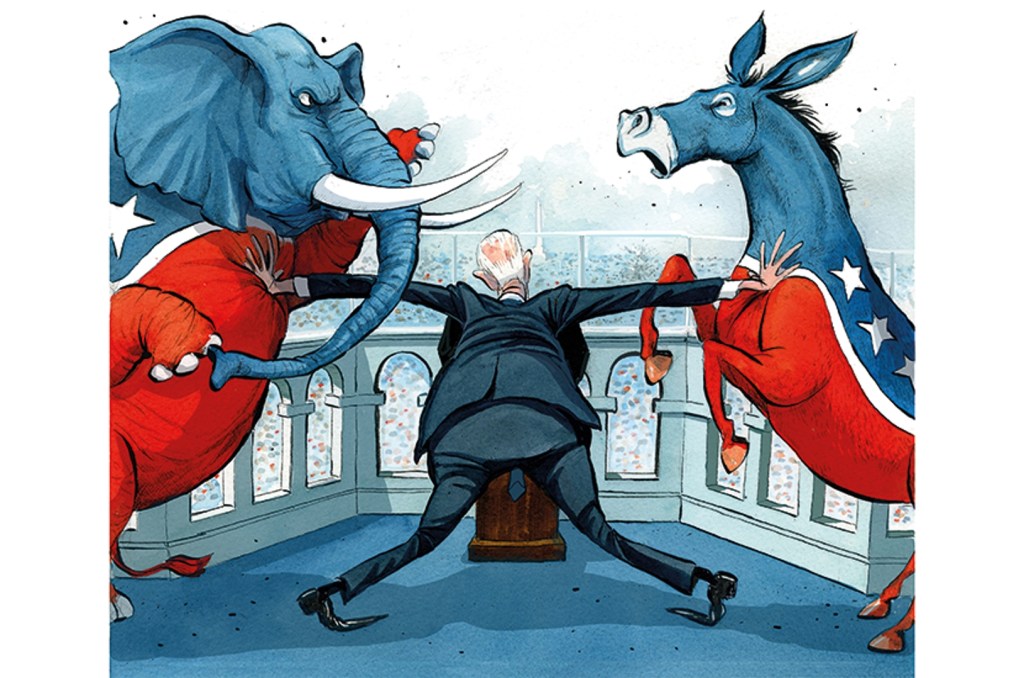Who wants bipartisanship? The short answer is: neither side, so neither is getting it.
Activists in both parties have been clear about that. There was a moment, last spring, when it seemed Democrats might opt for centrism. It came when Rep. James Clyburn endorsed Joe Biden, who went on to defeat Bernie Sanders and capture his party’s nomination.
Biden promised general election voters a center-left agenda and extensive bipartisanship, though he did bow occasionally to his party’s left-wing.
Biden may have been promising moderation and bipartisanship, but Donald Trump was not. Quite the contrary. He was a populist candidate who actually governed like one.
He was the full-throated embodiment of a large Republican movement, one that began a decade earlier with the Tea Party. They didn’t just reject Barack Obama’s big government programs. They rejected similar ones under George W. Bush and his brother Jeb. They loathed the party’s long-standing ties to big corporations and K-Street lobbying shops. They wanted to roll back the administrative state and rule by bureaucrats.
This conservative-populist wing of the party became ascendant. Except for a few moderate Republicans from purple states and wealthy suburbs, the liberal wing of the party — the old Nelson Rockefeller wing — was crushed.
In Congress, many were replaced by suburban Democrats, just as many conservative Southern Democrats were replaced by even more conservative Republicans. That resorting process made both parties more ideological, more uniform, with less room for internal dissent.
Conservative Republicans learned that lesson when several sought a compromise package on immigration. The pushback was fierce and immediate.
Still, Senate Republicans might have accepted some bipartisan deals if they had retained control of the Upper Chamber. Biden would almost certainly have offered them opportunities. That option disintegrated when Republicans lost both seats in the Georgia runoff. Now, the Democrats not only had control of the Senate (thanks to a 50-50 tie that Vice President Harris could break), they also controlled the House of Representatives and the White House. They were determined to wield that power, unilaterally if necessary, and pass the most ambitious agenda they could. That meant discarding unnecessary compromises that weakened their proposals.
After Georgia, Democrats could govern without any Republican help if they could keep all their senators in line, avoid filibusters, and lose only a few Democrats in House votes, where their margin was extremely narrow. The Senate filibuster survived only because a single Democrat, Sen. Joe Manchin of West Virginia, insisted publicly he would never relinquish it. (Manchin may have been quietly supported by Arizona Democrat Kyrsten Sinema.)
Still, the filibuster issue hasn’t gone away. It will return if the Democrats increase their Senate majority in 2022 (a possibility) and retain control of the House (much less likely). Democrats won’t try to kill the filibuster unless they simultaneously control the House, Senate and White House.
With the filibuster still in place, Democrats are relying on an arcane Senate rule which prohibits filibusters on financial legislation. In practice, that means financial bills, which have already passed the House, will make it through the Senate only if Joe Manchin approves. He’s the most moderate Democratic senator and is personally popular in West Virginia, but he’s the last Democrat standing in a state Trump won by some 40 points. He’s not going to be co-sponsoring any green energy bills with Alexandria Ocasio-Cortez.
If the Democrats aren’t interested in compromise — and they aren’t — Republicans can’t convincingly press for it either. They have no leverage in either chamber; their members fear losing primary elections if they are too eager to cooperate with Democrats.
Despite this chasm between the parties, a moderate White House would certainly have proposed bipartisan initiatives if Republicans had won the Senate. That would have been Biden’s only chance to pass legislation. The calculus changed completely when the Republicans lost Georgia. Joe Biden and his advisers saw a fleeting chance to go big, spend trillions, introduce major new entitlements and make his mark on history before the aging president fades into the sunset. They seized that chance and, with it, killed the last, slim chances of bipartisan compromise. On that, the sun has already set.


















